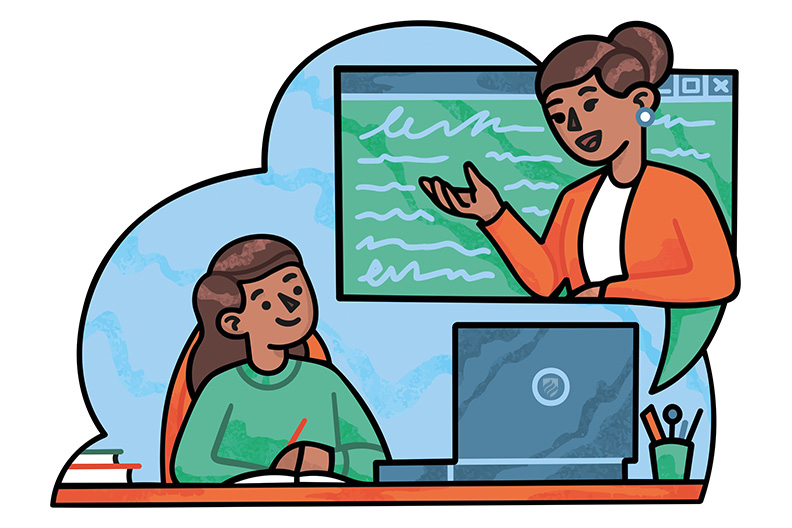4 Reasons to Love Teaching
CHALKING THE LINE | BY DEB MEYER | 7 MIN READ

Why choose teaching as a career? Many current and future teachers respond with something like, “I love kids.”
But is that really sufficient? Many professions involve working with kids. However, few professions can be as emotionally satisfying and simultaneously demanding as teaching. So in this month’s blog I want to unpack some of that passion with a simple acronym—LOVE—that highlights how teachers show their passion for teaching through their love of learning. And how their love for teaching keeps their passions flowing.
The Reasons to Love Teaching
Listening
Good teachers are good listeners. Phenomenal teachers are great listeners. The best teachers are genuinely interested in their students, so they enjoy hearing their ideas, reactions, experiences and thoughts. Teachers who listen well plan instruction that leverages student interests and experiences. There is nothing more powerful to students than authentic and relevant learning that excites them. And students can tell when teachers have listened carefully to them.
Teachers who listen …
… ask better questions, because they want to understand what their students are thinking. “Listening teachers” are able to adjust their instruction in the moment and more effectively respond to student ideas or misunderstandings.
… build strong student-teacher relationships that are essential for positive classroom environments. In emotionally healthy classrooms, teacher listening promotes student success both academically and social-emotionally. These teachers know their students and how they learn—they continually ask questions to get to know them better and monitor “How’s it going?”—in the classroom and in daily life.
… do so for relational and informational reasons. They find the ideas students come up with fascinating and their questions challenging. They learn from listening to students’ thinking—about students’ lives and about how to become better teachers.
… are passionate listeners and learners. And when you see them in a school setting, their students seem to be doing all the talking.
Take a few minutes to listen, and watch what I mean about this part of the LOVE of teaching by viewing the trailer for the film Passion to Teach.
Owning Mistakes
Passionate teachers take co-ownership in learning. This means that when teaching decisions don’t work for a student, the teacher owns it. It means that when students make mistakes, teachers own those mistakes with them. Why? Because when teachers are passionate about learning they view mistakes as essential guideposts on the way to more meaningful learning, and are partners with students.
Owning mistakes means attaining what Carol Dweck calls a “growth mindset.” Teachers who can help students see the constructive nature of our mistakes are excellent role models for learners. On the other hand, teachers who emphasize errorless learning are promoting a mindset of “Some of us have it, some don’t.” Where’s the passion in that belief?
An important way to model a growth mindset is to acknowledge mistakes publicly. All teachers make mistakes, but some spend their efforts downplaying them or avoiding them in the first place, rather than showing that errors are a natural part of learning. Students need to see their teachers struggle with new ideas, reflect skepticism, and admit that they just don’t know the answer or are having difficulty.
Owning mistakes builds trust because we trust people who are vulnerable and open with us. We find them honest, authentic and approachable. We are wary of making mistakes around people who are perfectionists or rarely stumble because we feel inadequate. But real learning is frequently difficult, frustrating and uncomfortable. We need to be with people who see our errors as progress, not defeat.
What’s your growth mindset?
Voicing Confidence
Teachers who are passionate believe in their students and never stop telling them that. These teachers believe that all students can be successful and aren’t afraid to tell them. Voicing confidence in students is really about voicing confidence in our own teaching. When teachers have high teaching efficacy, they believe they can help their students learn and be successful. And research has shown that students who have highly efficacious teachers feel more efficacious themselves.
Teacher efficacy is communicated through a consistent belief in student success. Teachers with high efficacy have growth mindsets because, rather than giving up, they seek out new ideas and try different approaches to make sure every student is supported.
Anita Woolfolk Hoy, whose research was seminal in this area, also emphasizes how important it is for groups of teachers working together to share “collective efficacy”—the belief that, as a team, they can help all students be successful. These teachers are passionate about their collective mission to be the best for their students because they voice confidence in their students’ ultimate success. When students have teachers who believe in them, their passion for learning is ignited.
If you’re a new teacher or an educator who has been teaching for many years, you might be skeptical about what has been suggested so far—LOV. But the ability to teach with passion is within every teacher who builds healthy relationships, steps out of the routine and stands up for students. Teaching with passion means you are confident in yourself and in your students. If you need more convincing, read this age-old advice from Jonathan Kozol.
Evolving
How do teachers stay passionate? They continuously evolve, which is another one of the reasons to love teaching. Passion in teaching transcends generations. Teachers change with their students by exploring new ideas, approaches and possibilities in a changing world. These teachers’ feet are never planted in one decade or rooted in one way of thinking. Instead, they continue to explore curriculum in different ways that are both relevant and meaningful to each generation. They are creative and embrace change. They like the fact that, in teaching, no two days are the same. Every class and every year opens up new possibilities for passionate teachers to explore along with their students.
Remaining passionate about teaching means that the work becomes all-consuming—not in the sense that we think of nothing else, but in the sense that everything we do is part of our identity as a teacher. The family vacation builds experiences that will find a place in the classroom. The classroom experiences will lead teachers to new projects outside of school. The passion will become an ebb and flow, giving teaching relevance and continuity.
One of my favorite stories of a teacher’s passion comes from Rafe Esquith’s book Teach Like Your Hair’s on Fire. He experienced being so absorbed in his science lesson one day that his hair caught on fire and he didn’t notice. But that’s just the beginning of his story (and the inspiration for the title of his book). In describing his teaching approach, he highlights how he also ignited the passion within himself and his students.
Why teach? A lot of teachers will proclaim that they are changing the world one student at a time. But I prefer an answer that is more like Macklemore’s quote because when teachers teach with passion, they are in the moment with their students: Listening, owning mistakes, voicing confidence and evolving with them.




Leave a Reply